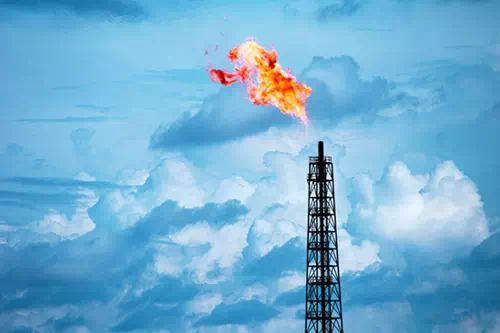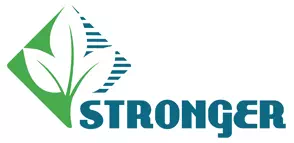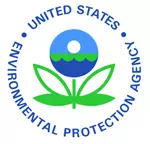|
Final Processing at Gas Plants
While some of the needed cleanup and processing can be accomplished at or near the wellhead (field processing), the complete processing of natural gas takes place at a processing plant, usually located in a natural gas producing region. Natural gas processing plants serve several functions:
- recover natural gas liquids from a stream of natural gas that may or may not have passed through lease separators and/or field separation facilities. Many of these separated natural gas liquids are directed to a separate plant to undergo what is referred to as a "fractionation" process.
-
control the quality of the natural gas to be marketed (i.e. produce pipeline quality gas). Natural gas mainline transmission systems are designed to operate within certain tolerances. Natural gas entering the system that is not within certain specific gravities, pressures, Btu content range, or water content level will cause operational problems, pipeline deterioration, or even cause pipeline rupture.
Gas Processing plants remove the remaining impurities remaining in the natural gas. This removal consists mostly of the following three processes:
-
Water removal
-
Separation of Natural Gas Liquids
-
Sulfur and Carbon Dioxide Removal
Potentially Applicable Regulations
-
Clean Air Act (CAA)
- 40 CFR Part 60 Subpart A. General provisions, including control device and work practice requirements for flares and compliance with standards and maintenance requirements (maintain air pollution control equipment in a manner consistent with good air pollution control practice for minimizing emissions).
- 40 CFR Part 63 Subpart A. General provisions, General provisions and compliance with standards and maintenance requirements (maintain air pollution control equipment in a manner consistent with good air pollution control practice for minimizing emissions).
- 40 CFR Part 60 Subpart OOOO and OOOOa. Standards for Performance for Crude Oil and Natural Gas. 40 CFR 63 Subpart HH. National Emission Standards for Hazardous Air Pollutants From Oil and Natural Gas Production Facilities.
- 40 CFR 60 Subpart JJJJ. Standards of Performance for Stationary Spark. Ignition Internal Combustion Engines.
- 40 CFR 60 Subpart GG. Standards of Performance for Stationary Gas Turbines.
-
40 CFR Part 60 Subpart KKK. Standards of Performance for Equipment Leaks of VOC at Onshore Natural Gas Processing Plants
- 40 CFR 60 Subpart KKKK. Standards of Performance for Stationary Combustion Turbines.
- 40 CFR 60 Subpart LLL. Standards of Performance for Onshore Natural Gas Processing: SO2 Emissions.
- 40 CFR 63 Subpart ZZZZ. National Emission Standards for Hazardous Air Pollutants for. Stationary Reciprocating Internal Combustion Engines (RICE).
- 40 CFR 98 Subpart W. Petroleum and Natural Gas Greenhouse Gas (GHG) Reporting Rule.
-
40 CFR 68 and CAA 112(r)(1). Chemical accident prevention provisions and the Risk Management Program.
- CERCLA. Reporting of spills if above reportable quantity for waste oils (e.g., F010, K042 through K048).
- Emergency Planning and Community Right-to-Know Act (EPCRA) (Sections 302, 303, 311, and 312). EPCRA requires facilities that use or store hazardous chemicals in certain quantities to report those inventories to state and local emergency planning organizations.
- Resource Conservation and Recovery Act (RCRA) Subtitle C (hazardous waste) and Subtitle D (solid waste). RCRA is the primary law for regulating solid and hazardous wastes.
- Available emergency response authorities to address adverse impacts:
-
Safe Water Drinking Act (SDWA) (Section 1431). Action to address imminent and substantial endangerment caused by contaminants present or likely to enter a public water system or underground source of drinking water.
-
Clean Air Act (CAA) (Section 303). Action to address imminent and substantial endangerment of public health or welfare, or the environment from air emissions or pollution.
- Comprehensive Environmental Response, Compensation, and Liability Act of 1980 (CERCLA) (Section 104) Removal action to address release that may present imminent and substantial endangerment, subject to the "petroleum exclusion."
- Comprehensive Environmental Response, Compensation, and Liability Act of 1980 (CERCLA) (Section 106). Order to address imminent & substantial endangerment, subject to the "petroleum exclusion."
- Clean Water Act (CWA) (Section 504). Action to address imminent & substantial endangerment to health, welfare, or livelihood caused by discharge from "pollution source."
-
CWA/OPA 311 action to address imminent and substantial threat to public health or welfare from discharges of oil or hazardous substances to navigable waters.
Resource Conservation and Recovery Act (RCRA) (Section 7003). Action to address solid waste handling that may present an imminent & substantial endangerment to health or the environment.
More Resources
Industry Standards for Design, Testing, Operation and Maintenance
|






